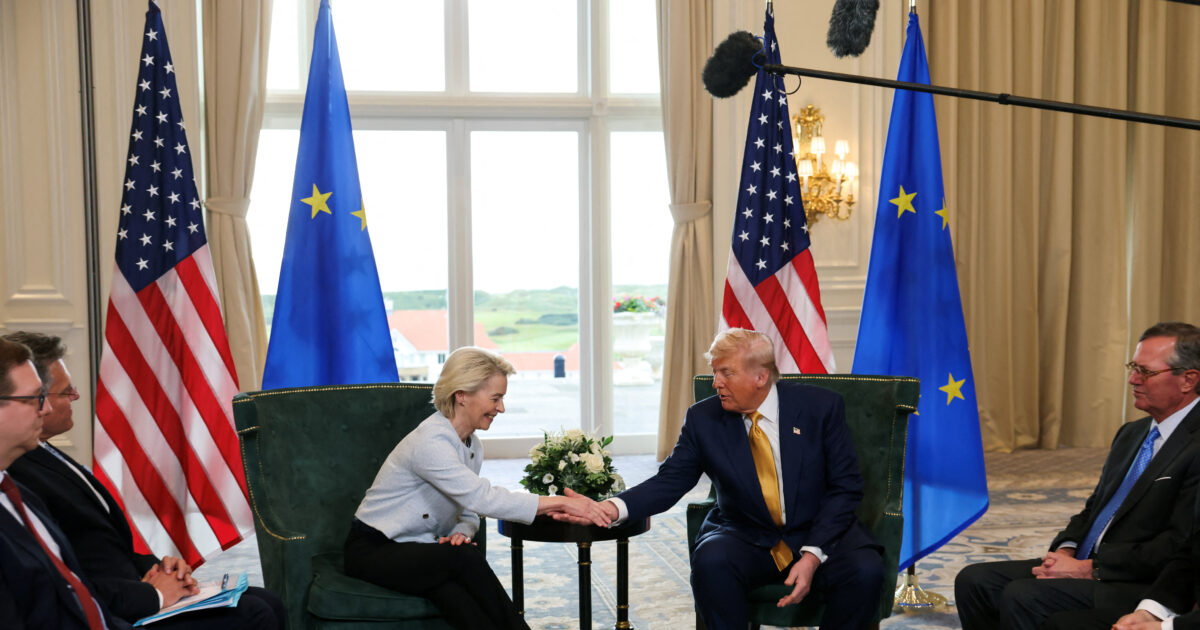Europeans have reached a compromise – framework with the Trump government, accepting 15% of imports on imports to USA And as the New York Times notes in their analysis, this agreement EU – USA It is not expected to boost European development.
For Brussels and the EU what he was before was Avoiding a trade war and keep open channels of communication with the US in a period of critical geopolitical developments.
The analysis begins with the phrase «Survive and advance» -an expression borrowed from the sport and knockout tournament-which means metaphorically “Survival at all costs”.
As the New York Timesthat was precisely the EU’s goal: not a triumph, but to avoid defeat to maintain its course under the pressure of US administration.
According to the US newspaper, Europe has chosen precisely this strategy in the recent trade negotiation with Washington. Frame Agreement between the two sides mainly concerns 15% US duty imposition In most imports of products from the European Union.
Especially for Europe, the agreement does not offer financial benefits. On the contrary, it is considered “the least bad” because it prevents a complete rupture and allows Europeans to focus on international issues that concern them most, with the main war in Ukraine.
Why did Brussels do back
For the Ursula von der Layen, Friedrich Mertz and Emmanuel Macron, The agreement, with the acceptance of adverse terms, is a step of avoiding further tensions with the US.
Commission President Ursula von der Laien said during a press conference with Donald Trump in Scotland that “it will bring stability. Will bring predictability. And this is very important for our businesses on both sides of the Atlantic. “
Europe, according to the analysis, He had the choice for a more strong reaction. EU member states had already agreed on a package of about $ 100 billion in US products.
If Trump was threatened with 30% duties from August 1Europeans could activate them. But in the end, they went back.
The indications were clear. The governments of Germany, France and other countries approached a common stance on the issue of response to duties. Europe needs economic growth and, like all economists, knows that duties are a deterrent.
The German Chancellor Friedrich Mertz He admitted shortly before the agreement was reached that “the duties, regardless of their level, hurt us all. “Not only us Europeans, but, in my strong belief, and the American economy in the long run.”
But Mertz has shown to accept the situation. “President Trump insists on wanting duties. This means that we should accept that the US government will continue to act in this way, at least as long as it has a commercial deficit. ” The Chancellor welcomed the agreement but noted a dose of bitterness: “I would certainly welcome further facilitating transatlantic trade.”
Unlike duties, European leaders do not appear willing to compromise on its issue Ukraine. Through telephone communications, personal contacts in the White House and meetings in Canada and the Netherlands, Brussels are trying to persuade Trump to distance himself from Vladimir Putin and continue to support Kiev.
In recent months, Europe has flattered Trump, has put pressure on him and has not hoped that US support can lead the Russian president to the negotiating table.
The agreement made yesterday (27.07.2025) in Scotland reduces the risk of undermining the diplomatic pressures that Europeans exert on Ukraine and other international fronts, such as Iran and the Middle East.
However, the risk has not been eliminated, the report notes. Canada and Mexico They had signed a new trade agreement with Trump in his first term. Today they are back in negotiations. This shows that there is no definitive character in what has happened.
‘We must not consider these agreements as final’, The Pantheon Macroeconomics Analysis Company also warned this week.
This concern is also expressed by many European officials in private discussions. Trump’s promises of Ukraine or for the defense of the allies in NATO, in the event of an attack, are not considered given. They know very well that his positions can change.
The US president’s mood is able to change, the terms of each agreement to be negotiated again.
This is also the strategy “Survive and move on” with Donald Trump: Every day is a new race.
